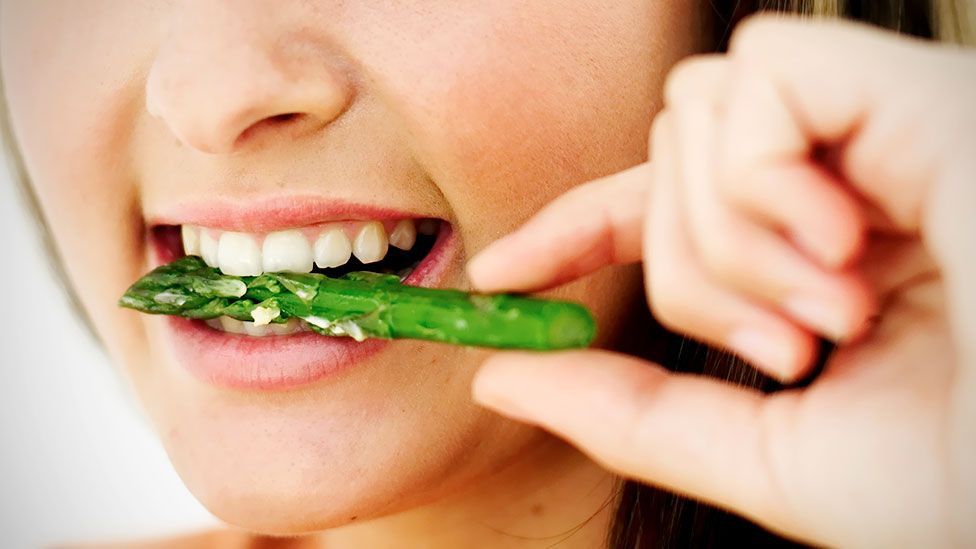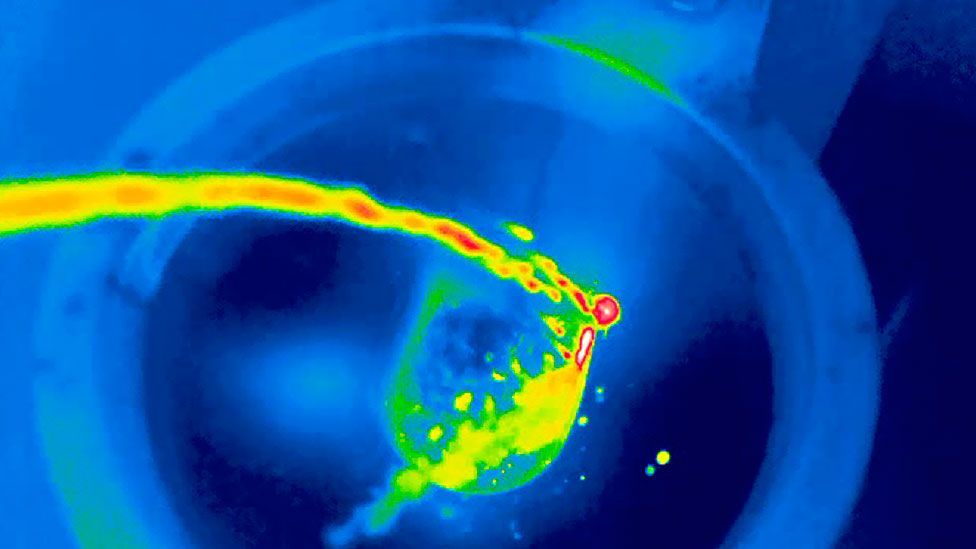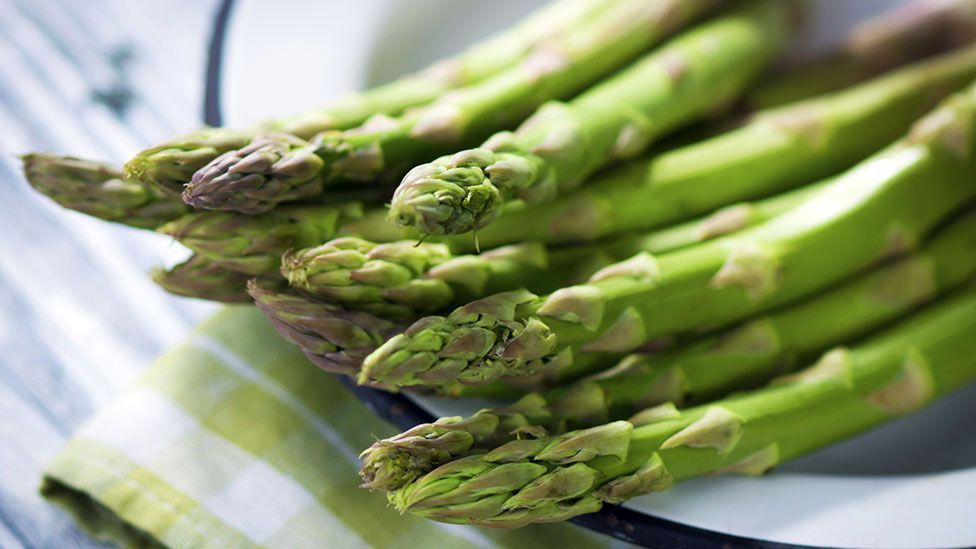Why Does Pee Smell Funny After Eating Asperagus
Why does asparagus make our urine smell?

After eating asparagus, some people can detect a strange smell, while others claim not to notice a thing. What's going on?
W
We've been aware of the pungent properties of asparagus for a long time. Back in 1731 the Scottish mathematician and doctor, John Arbuthnot wrote that asparagus gives urine "a foetid smell". Not everyone dislikes the smell, though: Marcel Proust said it had the effect of transforming his "humble chamber pot into a bower of aromatic perfume".
A quick straw poll over dinner (assuming you feel it's the right time to raise this kind of subject), typically reveals your guests fall in to certain camps. Some people will have never detected anything strange about their urine after they've eaten asparagus. Others assume that because their urine smells so strong afterwards, then so must everyone's. Then someone else may complicate matters by revealing they've smelt it after their partner has been in the bathroom, but can't detect it in their own urine.
On the basis of these observations, it seems that some people are producers of pungent asparagus-tainted urine, while some are detectors – but the two don't necessarily go together. But data is not the plural of anecdote, so more evidence is needed.
It's no good just asking people whether or not they can smell asparagus in their own urine. If they say yes, they're both a producer and a detector, but if they say no, we don't know whether they simply couldn't detect the smell. So what we need are laboratory experiments. Sniffing other people's urine might not be everyone's idea of fun, but several experimenters have managed to recruit enough volunteers to do it.
In 1956, a team of British researchers demonstrated that fewer than half of people produce the odour in their urine, which was assumed to be down to the influence of a single gene. Another British study from 1987, with a larger sample of 800, found a similar proportion. Confusingly, other studies have found a much higher percentage of producers. An American study from 1985 put the number at 79%, and one in 2010 at almost 92%. This raises the possibility there may be ethnic differences in the trait.
Perhaps further clues might come from the chemicals that produce the signature smell. One prime suspect from many studies is a sulphur compound called methanethiol. In the 1956 study, though, the researchers found methanethiol present in the urine of some asparagus-eaters and not others. But the researchers were only looking for compounds in the urine itself, which doesn't necessarily mean the smell could be detected. For that you need to examine the vapour given off by the urine. Analysis of the vapour using gas chromatography revealed four compounds. The strongest smelling are methanethiol and dimethyl sulphide which smell like old cabbage. There are also two compounds which might give the odour that tinge of sweetness.

A thermogram of a man urinating into a toilet. Thermography records the temperature of objects by detecting long- wavelength radiation (Science Photo Library)
These compounds are unlikely to have been in the asparagus when we ate it; they are small and delicate molecules that cooking would destroy. So what we need is a substance only found in asparagus, which remains intact during cooking, but is broken down by the body to produce the smaller odorous compounds. Appropriately there is a substance unique to asparagus called asparagusic acid. Could this be the source of the smell? So far no one has been able to prove that it creates the distinctive smell, but nor can they find another chemical that fits the description.
That's as much as we know about producers, but what about the detectors? Some studies seem to confirm the suspicion that not everyone is able detect the pong. When people in Israel were given different dilutions of the urine to sniff, only 10% could detect the asparagus. And in a Chinese sample only 24% could do it.
The problem with some studies, such as the Israeli one, is that people were asked to compare asparagus urine with water, rather than with non-asparagus urine, so they could have been detecting other notes in the urine, rather than asparagus in particular.
At the Monell Chemical Senses Center in Philadelphia, physiological psychologist Marcia Pelchat was determined to get to the bottom of the mystery. One day she had her volunteers drink a bottle of water and eat asparagus which had been roasted for eight minutes in some olive oil with a little salt. Then nature took its course and two hours later the ensuing urine was put into the deep freeze. The next day the same people were given the same-sized bottle of water along with an Italian bread roll containing the same amount of oil and salt as the asparagus. Then the rest of the procedure was repeated. Of the volunteers that sniffed their own and other subject's urine, only 8% were non-producers and only 6% were non-detectors.
It is theoretically possible that people may lack an enzyme which prevents them from both producing and detecting a particular odour in urine. But so far there doesn't seem to be much evidence of this – the study showed just one person neither produced nor detected the asparagus.

The sweet smell of excess - do we have to eat large quantities of asparagus before we can smell it in our urine? (Getty Images)
From her results, Pelchat found evidence that the ability to detect the smell was related to a single gene, but she saw no such link for odour production. So we still don't know why it is that some people seem not to create this smell. Is it that they've not absorbed it, not processed it on the body or not excreted it? Or perhaps we all excrete it, but some do so in such tiny quantities that they would need to eat several bunches of asparagus before it was detectable by other humans.
So, we still can't answer a simple question like why asparagus makes our urine smell strange. And even if we do find the solution we may never know why Arbuthnot thought the smell is repugnant while some, like Proust, find it so delightful. Sometimes, there's just no accounting for taste.
If you would like to comment on this, or anything else you have seen on Future, head over to our Facebook or Google+ page, or message us on Twitter .
You can hear more Medical Myths on Health Check on the BBC World Service .
Disclaimer
All content within this column is provided for general information only, and should not be treated as a substitute for the medical advice of your own doctor or any other health care professional. The BBC is not responsible or liable for any diagnosis made by a user based on the content of this site. The BBC is not liable for the contents of any external internet sites listed, nor does it endorse any commercial product or service mentioned or advised on any of the sites. Always consult your own GP if you're in any way concerned about your health.
threlkeldneen1997.blogspot.com
Source: https://www.bbc.com/future/article/20140818-mystery-of-asparagus-and-urine